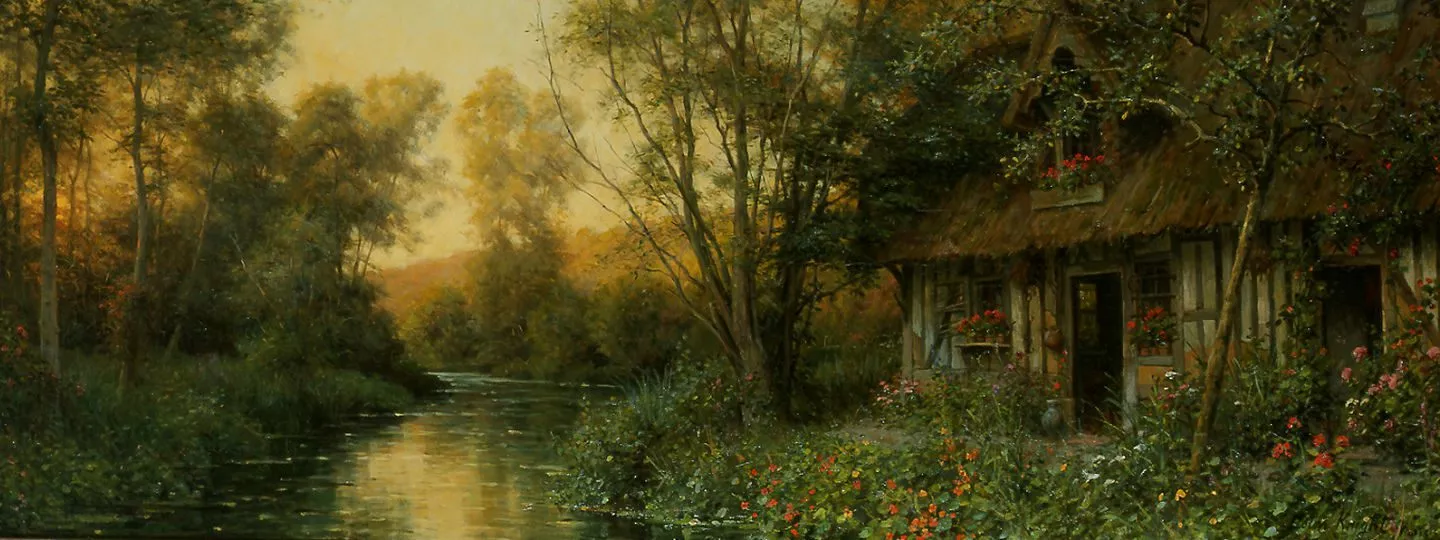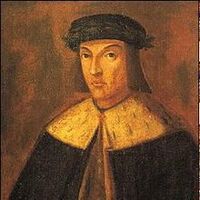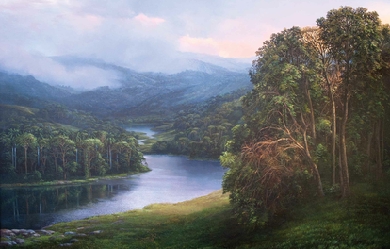
The Coplas on the Death of His Father, the Grand-Master of Santiago
The Introit
Let from its dream the soul awaken,
And reason mark with open eyes
The scene unfolding,—
How lightly life away is taken,
How cometh Death in stealthy guise,—
At last beholding;
What swiftness hath the flight of pleasure
That, once attained, seems nothing more
Than respite cold;
How fain is memory to measure
Each latter day inferior
To those of old.
Beholding how each instant flies
So swift, that, as we count, 'tis gone
Beyond recover,
Let us resolve to be more wise
Than stake our future lot upon
What soon is over.
Let none be self-deluding, none,—
Imagining some longer stay
For his own treasure
Than what today he sees undone;
For everything must pass away
In equal measure.
Our lives are fated as the rivers
That gather downward to the sea
We know as Death;
And thither every flood delivers
The pride and pomp of seigniory
That forfeiteth;
Thither, the rivers in their splendor;
Thither, the streams of modest worth,—
The rills beside them;
Till there all equal they surrender;
And so with those who toil on earth,
And those who guide them.
The Invocation
I turn me from the praise and singing
Of panegyrists, and the proud
Old poets' stories;
I would not have them hither bringing
Their artful potions that but cloud
His honest glories;
On Him Alone I lay my burden—
Him only do I now implore
In my distress,—
Who came on earth and had for guerdon
The scorn of man that did ignore
His Godliness.
This world is but a highway going
Unto that other, the abode
Without a sorrow;
The wise are they who gird them, knowing
The guideposts set along that road
Unto tomorrow.
We start with birth upon that questing;
We journey all the while we live,
Our goal attaining
The day alone that brings us resting,
When Death shall last quiétus give
To all complaining.
This were a hallowed world indeed,
Did we but give it the employ
That was intended;
For by the precepts of our Creed
We earn hereby a life of joy
When this is ended.
The Son of God Himself on earth
Came down to raise our lowly race
Unto the sky;
Here took upon Him human birth;
Here lived among us for a space;
And here did die.
Behold what miserable prize—
What futile task we set upon,
Whilst greed awakes us!
And what a traitor world of lies
Is this, whose very gifts are gone
Ere Death o'ertakes us!
Some through increasing age deprived,
Some by unhappy turn of fate
Destroyed and banished,
Some, as with blight inherent rived
At topmost of their branching state,
Have failed and vanished.
Yea, tell me shall the lovely blason,
The gentle freshness and contour
Of smiling faces,—
The blush and pallor's sweet occasion,—
Of all—shall one a truce secure
From Time's grim traces?
The flowing tress, the stature slender,
The corporal litheness, and the strength
Of gallant youth,—
All, all,—to weariness surrender
As o'er them falls the shadow's length
Of age in truth.
The Visigoths whose lineage kingly
Whose feats of war and mighty reign
Were so exalted,—
What divers ways did all and singly
Drop down to the obscure again
And were defaulted!
Some through their worthlessness (How lowly
And base among the rabble came
Their estimation!)
Whilst others as a refuge solely
In offices they only shame
Maintain their station.
Estate and luxury's providing
Can leave us pauper—who may doubt?—
Within an hour;
Let us not count on their abiding,
Since there is nothing sure about
Dame Fortune's dower.
Hers are the gifts of one unstable
Upon her globe as swift as light
Revolving ever;
Who to be constant is unable,
Who cannot stay nor rest from flight
On aughtsoever.
And though, say I, her highest favor
Should follow to the tomb and heap
With wreaths her master;
Let not our solid judgment waver
Since life is like a dream and sleep
Flies nothing faster.
The soft occasions of today
Wherein we find our joy and ease
Are but diurnal;
Whilst the dread torments that must pay
The cost of our iniquities
Shall be eternal.
The pleasures light, the fond evasions
That life on troubled earth deploys
For eyes of mortals,
What are they but the fair persuasions
Of labyrinths where Death decoys
To trap-like portals?
Where heedless of the doom ensuing
We hasten laughing to the snare
Without suspicion.
Until aghast at our undoing,
We turn to find the bolt is there,
And our perdition.
Could we but have procured the power
To make our faded youth anew
Both fresh and whole,
As now through life's probation hour
'Tis ours to give angelic hue
Unto the soul,—
What ceaseless care we then had taken,
What pains had welcomed, so to bring
A health but human,—
Our summer bloom to re-awaken,
Our stains to clear,—outrivalling
The arts of woman!
The kings whose mighty deeds are spacious
Upon the parchments of the years,
Alas!—the weeping
That overtook their boast audacious.
And swept their thrones to grime and tears
And sorrow's keeping!
Naught else proves any more enduring;
Nor are the popes, nor emperors,
Nor prelatries
A longer stay or truce securing
Than the poor herdsman of the moors
From Death's decrees.
Recount no more of Troy, or foeman
The echo of whose wars is now
But far tradition;
Recount no more how fared the Roman
(His scroll of glories we allow)
Nor his perdition;
Nor here rehearse the homely fable
Of such as yielded up their sway
These decades gone;
But let us say what lamentable
Fate the lords of yesterday
Have fallen upon.
Of fair Don Juan the king that ruled us,—
Of those hight heirs of Aragon,—
What are the tidings?
Of him, whose courtly graces schooled us,
Whom song and wisdom smiled upon,
Where the abidings?
The jousts and tourneys where vaunted
With trappings, and caparison,
And armor sheathing,—
Were they but phantasies that taunted,—
But blades of grass that vanished on
A summer's breathing?
What of the dames of birth and station,
Their head-attire, their sweeping trains,
Their vesture scented?
What of that gallant conflagration
They made of lovers' hearts whose pains
Were uncontented?
And what of him, that troubadour
Whose melting lutany and rime
Was all their pleasure?
Ah, what of her who danced demure,
And trailed her robes of olden time
So fair a measure?
Then Don Enriqué, in succession,
His brother's heir,—think, to what height
Was he annointed!
What blandishment and sweet possession
The world prepared for his delight,
As seemed appointed!
Yet see what unrelenting foeman,
What cruel adversary, Fate
To him became;
A friend befriended as was no man—
How brief for him endured the state
His birth might claim.
The golden bounties without stinting,
The strongholds and the lairs of kings
With treasure glutted;
The flagons of their wassail glinting,
The sceptres, orbs, and crowns, and rings
With which they strutted;
The steeds, the spurs, and bits to rein them,
The pillions draped unto the ground
Beneath their paces,—
Ah, whither must we fare to gain them?—
That were but as the dews around
The meadow places.
His brother then, the unoffending,
Who was intruded on his reign
To act as heir,—
What gallant court was round him bending,
How many a haughty lord was fain
To tend him there!
Yet as but mortal was his station,
Death for his goblet soon distilled
A draught for draining;
O Thou Divine Predestination!—
When most his blaze the world had filled
Thou sent'st the raining!
And then, Don Alvaro, Grand-Master
And Constable, whom we have known
When loved and dreaded,—
What need to tell of his disaster,
Since we behold him overthrown
And swift beheaded!
His treasures that defied accounting,
His manors and his feudal lands,
His boundless power,—
What more than tears were their amounting?
What more than bonds to tie his hands
At life's last hour?
That other twain, Grand-Masters solely,
Yet with the fortunes as of kings
Fraternal reigning,—
Who brought the high as well as lowly
Submissive to their challengings
And laws' ordaining.
And what of all their power and prize
That touched the very peaks of fame
That none could limit?—
A conflagration 'gainst the skies,
Till at its brightest ruthless came
Death's hand to dim it.
The dukes so many and excelling,
The marquises, and counts, the throng
Of barons splendid,
Speak, Death, where hast thou hid their dwelling?
The sway we saw them wield so strong—
How was it ended?
What fields upon were they engaging,—
What prowess showing us in war
Or its cessation,
When thou, O Death, didst come outraging
Both one and all, and swept them o'er
With desolation.
Their warriors' unnumbered hosting,
The pennon, and the battle-flag,
And bannered splendor,—
The castles with their turrets boasting,
Their walls and barricades to brag
And mock surrender,—
The cavern's ancient crypt of hiding,
Or secret passage, vault, or stair,—
What use affords it?
Since thou upon thy onslaught striding
Canst send a shaft unerring where
No buckler wards it!
O World that givest and destroyest
Would that the life which thou hast shown
Were worth the living!
But here, as good or ill deployest,
The parting is with gladness known
Or with misgiving.
Thy span is so with griefs encumbered
With sighing every breeze so steeped,
With wrongs so clouded,
A desert where no boon is numbered,
The sweetness and allurement reaped
And black and shrouded.
Thy highway is the road of weeping;
Thy long farewells are bitterness
Without a morrow;
Adorn thy ruts and ditches keeping
The traveller who doth most possess
Hath most of sorrow.
Thy chattels are but had with sighing;
With sweat of brow alone obtained
The wage they give;
In myriads thine ills come hieing,
And once existence they have gained,
They longest live.
And he, the shield and knightly pastor
Of honest folk, beloved by all
The unoffending,—
Don Roderic Manrique, Master
Of Santiago,—Fame shall call
Him brave unending!
Not here behooves to chant his praises
Or laud his valor to the skies,
Since none but knows them;
Nor would I crave a word that raises
His merit higher than the prize
The world bestows them.
O what a comrade comrades found him!
Unto his henchmen what a lord!
And what a brother!
What foeman for the foes around him!
His peer as Master of the Sword
There was no other!
What precious counsel 'mid the knowing!
What grace amid the courtly bower!
What prudence rare!
What bounty to the vanquished showing!
How 'mid the brave in danger's hour
A lion there!
In destiny a new Augustus;
A Caesar for his victories
And battle forces;
An Africanus in his justice;
A Hannibal for energies
And deep resources;
A Trajan in his gracious hour;
A Titus for his open hand
And cheer unfailing;
His arm, a Spartan king's in power;
His voice, a Tully's to command
The truth's prevailing!
In mildness Antoninus Pius;
A Marc Aurelius in the light
Of calm attending;
A Hadrian to pacify us;
A Theodosius in his right
And high intending;
Aurelius Alexander stern
In discipline and laws of war
Among his legions;
A Constantine in faith eterne;
Gamaliel in the love he bore
His native regions.
He left no weighty chests of treasure,
Nor ever unto wealth attained
Nor store excelling;
To fight the Moors was all his pleasure
And thus his fortresses he gained,
Demesne, and dwelling.
Amid the lists where he prevailed
Fell knights and steeds into his hands
Through fierce compression,
Whereby he came to be regaled
With vassals and with feudal lands
In fair possession.
Ask you how in his rank and station
When first he started his career
Himself he righted?
Left orphan and in desolation
His brothers and his henchmen dear
He held united.
And ask you how his course was guided
When once his gallant deeds were famed
And war was ended?
His high contracting so provided
That broader, as his honors claimed,
His lands extended.
And these, the proud exploits narrated
In chronicles to show his youth
And martial force,
With triumphs equal he was fated
To re-affirm in very sooth
As years did course.
Then for the prudence of his ways,
For merit and in high award
Of service knightly,
His dignity they came to raise
Till he was Master of the Sword
Elected rightly.
Finding his father's forts and manors
By false intruders occupied
And sore oppressed,
With siege and onslaught, shouts and banners,
His broad-sword in his hand to guide,
He re-possessed.
And for our rightful king how well
He bore the brunt of warfare keen
In siege and action,
Let Portugal's poor monarch tell,
Or those who in Castile have been
Among his faction.
Then having risked his life, maintaining
The cause of justice in the fight
For law appointed,
With years in harness spent sustaining
The royal crown of him by right
His lord anointed,
With feats so mighty that Hispania
Can never make account of all
In number mortal,—
Unto his township of Ocaña
Came Death at last to strike and call
Against his portal:
Speaketh Death
“Good Cavalier,”—he cried,—“divest you
Of all this hollow world of lies
And soft devices;
Let your old courage now attest you,
And show a breast of steel that vies
In this hard crisis!
“And since of life and fortune's prizes
You ever made so small account
For sake of honor,
Array your soul in virtue's guises
To undergo this paramount
Assault upon her!
“For you, are only half its terrors
And half the battles and the pains
Your heart perceiveth;
Since here a life devoid of errors
And glorious for noble pains
To-day it leaveth;
“A life for such as bravely bear it
And make its fleeting breath sublime
In right pursuing,
Untainted, as is their's who share it
And put their pleasure in the grime
Of their undoing;
“The life that is The Everlasting
Was never yet by aught attained
Save meed eternal;
And ne'er through soft indulgence casting
The shadow of its solace stained
With guilt infernal;
“But in the cloister holy brothers
Besiege it with unceasing prayer
And hard denial;
And faithful paladins are others
Who 'gainst the Moors to win it bear
With wound and trial.
“And since, O noble and undaunted,
Your hands the paynim's blood have shed
In war and tourney,—
Make ready now to take the vaunted
High guerdon you have merited
For this great journey!
“Upon this holy trust confiding,
And in the faith entire and pure
You e'er commended,
Away,—unto your new abiding,
Take up the Life that shall endure
When this is ended!”
Respondeth the Grand-Master
“Waste we not here the final hours
This puny life can now afford
My mortal being;
But let my will in all its powers
Conformable approach the Lord
And His decreeing.
“Unto my death I yield, contenting
My soul to put the body by
In peace and gladness;
The thought of man to live, preventing
God's loving will that he should die,
Is only madness.”
The Supplication
O Thou who for our weight of sin
Descended to a place on earth
And human feature;
Thou who didst join Thy Godhead in
A being of such lowly worth
As man Thy creature;
Thou who amid Thy dire tormenting
Didst unresistingly endure
Such pangs to ease us;
Not for my mean deserts relenting,
But only on a sinner poor,
Have mercy, Jesus!
The Codicil
And thus, his hopes so nobly founded,
His senses clear and unimpaired
So none could doubt him,—
With spouse and offspring fond surrounded,
His kinsmen and his servants bared
And knelt around him,—
He gave his soul to Him who gave it,
(May God in heaven ordain it place
And share of glory!)
And left our life as balm to save it,
And dry the tears upon our face!
His deathless story.
Translated by Thomas Walsh
(1477)





